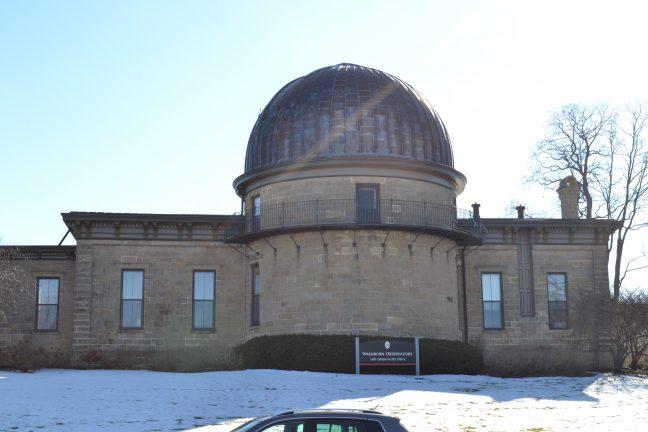Editor’s note: The Lab Report is a weekly series in The Badger Herald’s where we take a deep dive into the (research) lives of students and professors outside the classroom
University of Wisconsin students working for Andrew Vanderburg’s lab at the Massachusetts Institute of Technology are studying exoplanets, or planets orbiting stars other than the sun.
Assistant professor of physics at MIT Andrew Vanderburg said the lab is exploring what happens to planets after the stars they orbit, like the sun, die. When the sun dies, Vanderburg said the solar system will change radically.
“[The sun] will actually swell to be about 200 times its size which will put its outer layers roughly at the location of Earth’s orbit today,” Vanderburg said. “So that’ll be a bad place to be, I wouldn’t recommend any really long-term real estate investments but hopefully we’ll have moved on by then. We have about 7 billion years to prepare.”
The Lab Report: Alternate solutions for natural products using plant tissue
After the sun expands, inner planets will die and the sun will begin to collapse inward, Vanderburg said. The sun will collapse until it turns into a white dwarf, which is what Vanderburg studies.
White dwarves, which are a smaller and extremely dense stars, have much less gravitational pull. Vanderburg said some planets can kick other planets to places they couldn’t have been before, and other planets may be ripped apart by the white dwarf or move back toward the star.
Undergraduate senior Sarah Kubiak is majoring in astrophysics and life sciences communication. Kubiak said she was first interested in astronomy watching “Cosmos” with Neil deGrasse Tyson as a child and that she was always interested in space. In the future, Kubiak said she’d like to work in astronomy outreach to teach the public about science and astronomy.
Within Vanderburg’s lab, Kubiak creates models of an existing Jupiter-sized planet orbiting a white dwarf. One of Kubiak’s biggest challenges with her project is learning how to code. When she joined Vanderburg’s lab, Kubiak said she didn’t know how to code. Though she has since learned some code, Kubiak said she still struggles with getting the code to work.
Kubiak’s favorite part of working in Vanderburg’s lab is meeting with the lab group. In group meetings, Kubiak said lab members get help with problems in their research and the members of the lab are always at the ready to help one another.
The Reproducibility Crisis: What happens when scientists can’t recreate established findings?
Another benefit of these group meetings is their casual setting, Kubiak said. She said that presenting information to the group isn’t intimidating and members of the lab are there to improve the science.
The lab also taught Kubiak the value of collaboration and how the scientific process works. She said learning how to start a research project is applicable to other things in life, too.
“Even though I might not continue in research specifically, I know how to set goals and like get myself there and do those kinds of things, so I think that’s something really, really valuable,” Kubiak said.
Through practice, Kubiak said she learned in the lab is that science isn’t a perfect process. Kubiak’s research is creating ideas about how exoplanets migrated, but this comes with the acceptance that new data could arise with a better explanation.
Kubiak’s lab group works a lot with outreach. UW graduate student Bob Aloisi works on a project that allows community members to visit a website and look through a telescope with the researchers, Kubiak said. Vanderburg also created a website to explain exoplanets and how the lab detects them.
“Our group does a lot of some really cool outreach, which I think is just a really cool feature of our lab that we do all these really cool things that the community can get involved in and know what’s going on,” Kubiak said.
Vanderburg’s interest in astronomy started when he was a child — at 5 years old, he was already drawing the solar system. When he entered college, Vanderburg said he took an astronomy class and was fascinated by learning about things that are far away.
UW collaborates with NASA to launch small satellites, collect unprecedented data
“I liked the way you had to be able to infer things without being able to go and touch them,” Vanderburg said. “I liked the kind of tricks you had to play to learn even the most basic things.”
After earning his undergraduate and PhD and working as a postdoc, he worked as an assistant professor in astronomy at UW and moved to MIT at the end of last summer.
In the past, Vanderburg said he struggled his role as an astronomer. He felt that he could’ve been researching a cure for cancer or ways to prevent global warming, but now he believes his research is important for other reasons.
“It’s important for us to learn things and do science for other reasons than the strict development of knowledge and tools that will help us immediately,” Vanderburg said. “I like to think that by doing this I can make a difference and try to convince people that learning is good, knowledge is good and that there is a reason to kind of go out and just seek truth for truth’s sake.”
























